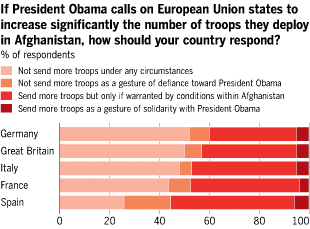“We can do better,” NATO Secretary General Jaap de Hoop Scheffer said of the alliance’s Afghanistan mission in Sunday’s WaPo. Indeed, President Obama has made Afghanistan a top priority, and in addition to deploying more U.S. troops there, he is also expected to ask for greater European troop contributions. Yet, recent opinion polls and statements in Europe indicate that this is unlikely.
In the Polls
According to a poll conducted across five western European countries from January 8–15 by the FT and Harris Interactive, a majority of people felt that their governments should not send more troops to Afghanistan. The percentage of those against further troop contributions under any circumstances:
- Germany: 60%
- UK: 57%
- Italy: 53%
- France: 53%
Only in Spain did a majority respond in favor of deploying additional forces. Perhaps more alarming is the fact that sizable portions of those polled in each country cited a “gesture of defiance toward President Obama” as the reason not to contribute troops:
 |
| Poll by Financial Times / Harris Interactive (FT) |
(The poll evoked an interesting debate between Daniel Drezner at Foreign Policy and an Economist blog over the extent to which European domestic opinion constrains government policy. Drezner’s original piece here. Democracy in America‘s argument that his piece is overly critical of France here. Drezner’s rebuttal here.)
In Quotes
European governments have largely reflected the popular opinion of their citizens. The UK (the second largest NATO contributor after the U.S. with 8,900 troops) appears to be an exception to this trend, where comments by officials have been relatively open to Obama’s anticipated requests. Last week, British officials urged European NATO members to commit more troops to ISAF, and in December of last year, the UK announced plans to start withdrawing troops from Iraq in March, fueling speculation that they may be redeployed to Afghanistan. Brown also stressed the importance of the “special relationship” after Obama’s inauguration.
In Germany (the third largest NATO contributor with 3,500 troops), a policy paper intentionally released at the same time as Obama’s inauguration called for a “contact group” of parties to forge a new Afghanistan political strategy. Deutsche Welle:
The group, the document says, should not only include the five permanent UN Security Council members – the United States, Britain, France, China and Russia – but also the European Union, Iran and Pakistan. … A similar idea for a “contact group” to coordinate international strategy in Afghanistan was proposed by former French President Jacques Chirac in 2006, but was not supported by Washington. Presented on the day of President Barack Obama’s inauguration and under the title “For a Closer Transatlantic Partnership,” foreign policy experts from the Christian Democrats called on the new U.S. president to look for alternatives to an increase in troops, which Obama has advocated.
Additionally, Merkel ruled out sending German troops into the volatile southern region of Afghanistan:
Germany is among European nations bracing for demands from the new U.S. administration that they do more in Afghanistan, but the Germans are reluctant to send more troops and believe talks on a new strategy for stabilizing the country are the main priority. Chancellor Merkel has said that she would not accede to any request from the new U.S. administration to send troops to southern Afghanistan, the scene of much of the heavy fighting against Taliban insurgents. “Wherever Germany commits itself, a wholeness of military and civilian assistance should be visible,” she said.
France (the fourth largest NATO contributor with 2,800 troops) similarly ruled out any further deployments. Regarding ISAF, Defense Minister Herve Morin stated in an interview on Wednesday, “So for France, we have made the necessary effort. Considering additional reinforcements is out of the question for now.” However, after the interview, French officials quickly downplayed the significance of Morin’s remarks.
Effect on Transatlantic Relations
Several analysts have addressed the effects that European resistance to troop increases might have on transatlantic relations. In an interview with CFR, Robert Hunter offered this assessment:
Bottom line: There will be some token response to an appeal from the U.S. administration. But it will only be a token response. According to the polling data, there’s not a single European country that wants to see more of its troops go to Afghanistan. In many of them, it is a question of how long they will continue to be involved. I rather suspect if the United States pushes too hard on asking for new forces, it will lead to a rebuff, and at the beginning of an administration you don’t want to be rebuffed.
Nikolas Gvosdev echoed this sentiment in piece for the New Atlanticist on Thursday: “In other words, I would agree that many European capitals are happy that there’s a new Administration in Washington–but they aren’t eager to suddenly and quickly fall in line behind whatever initiative suddenly emerges from Washington. And this could prove to be a rude awakening for those who have assumed otherwise.”
Michael O’Hanlon of Brookings likewise warned, “The European rationale for why it’s hard to do more will not be met with a great deal of American sympathy – and will especially fail to impress American voters, who will be disappointed that Obama’s style of leadership does not elicit more genuine burden-sharing.”
The governments and people of Europe remain overwhelmingly enthusiastic about Obama. But whether Europe’s likely rejection of Obama’s calls for greater troop contributions to Afghanistan will strain this good will remains a large unanswered question.
Peter Cassata is associate editor of the Atlantic Council.
